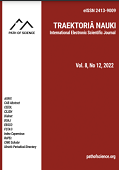Comparative Analysis of the Effectiveness of Polymerase Chain Reaction and Microscopy in Malaria Diagnosis
Comparative Analysis of the Effectiveness of Polymerase Chain Reaction and Microscopy in Malaria Diagnosis
Author(s): Ismail Muhammad, Tanko Mahmoud Mohammed, Asiya Muhammad Usman, Bala AbubakarSubject(s): Health and medicine and law, Demography and human biology
Published by: Altezoro, s. r. o. & Dialog
Keywords: Malaria Diagnosis; Polymerase Chain Reaction; Microscopy; Sensitivity; Specificity; Accuracy;
Summary/Abstract: Malaria is a life-threatening parasitic disease which causes enormous morbidity and mortality in tropical African countries. Successful prevention and treatment of infected individuals heavenly depend on successful diagnosis using recommended techniques. These routine laboratory techniques have different performance indices. Therefore, this study aimed to evaluate the performance of Polymerase Chain Reaction and Microscopy in malaria diagnosis. A total of two hundred consented study subjects were randomly selected and enrolled for the research. Vein puncture technique was use to collect venus blood from the subjects and analysed using microscopy and Polymerase chain Reaction. DNA samples were extracted using Quick-DNA™ Miniprep Plus Kit with catalogue No. D4069. 18SrRNA gene of Plasmodium falciparum from chromosome 13 was amplified using the primers F5’AACAGACGGGTAGTCATGATTGAG3’ R5’GTATCTGATCGTCTTCACTCCC3’. Malaria prevalence of 167(83.50%) and 105(52.5%) were recorded using microscopy and Polymerase Chain Reaction. Microscopy had a sensitivity, specificity, Positive predictive value and negative predictive value of 84.91, 23.40, 55.53 and 57.89%, respectively, with an overall accuracy value of 0.81. Polymerase Chain Reaction had a sensitivity value of 53.89%, specificity of 54.54%, positive predictive value of 85.79% and Negative predictive value of 18.94% with an overall accuracy of 0.54. Microscopy and Polymerase Chain Reaction demonstrated significant accuracy and relatively good performance indices. Therefore Microscopy and Polymerase Chain Reaction are highly recommended as malaria diagnostic techniques, and further research should be carried out to determine the influence of some biological factors of both the parasite and the host on the outcome of the diagnosis using both Polymerase Chain Reaction and microscopy.
Journal: Traektoriâ Nauki
- Issue Year: 9/2023
- Issue No: 01
- Page Range: 6001-6009
- Page Count: 9
- Language: English

